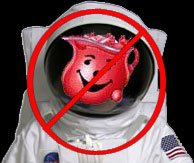So What IS Their Mission...?
From a recent interview (courtesy of Space Daily):
GRIFFIN: Nowhere in NASA's authorization, which of course governs what we do, is there anything at all telling us that we should take actions to affect climate change in either one way or another. We study global climate change, that is in our authorization, we think we do it rather well. I'm proud of that, but NASA is not an agency chartered to quote "battle climate change."
----
Riddle me this, readers - can anyone point the Cynics to the actual authorization so we can see what NASA really IS supposed to be doing, according to Mr. Griffin's "If it's not in the Authorization, it's not our mission" criteria? Perhaps he can get them out of those silly manned space missions to nowhere while he's at it?
I don't care if you are in the "Global Warming is a crisis" camp or the "Global Warming is Hyped" camp - or, if you're in the Global Warming is a natural phenomenon camp for that matter. The issue I want to dig into here is what IS the mission of NASA? The organisation has many different arms - from the most well known and dysfunctional (Manned Space) to the often times brilliantly successful (robotic space - e.g., Hubble) to the virtually unknown by the masses (biology, aeronautics, etc). When I used to do strategic planning work with NASA back in my KPMG days, their "strategic plans" were a mishmash of different objectives and directions. I doubt much has changed, other than the lettering of Codes at NASA HQ.
The question at the root of all this is: Does NASA even know what it's "elevator pitch" mission is, and can anyone succinctly describe it here?
The soapbox is open, let's hear your ideas.
GRIFFIN: Nowhere in NASA's authorization, which of course governs what we do, is there anything at all telling us that we should take actions to affect climate change in either one way or another. We study global climate change, that is in our authorization, we think we do it rather well. I'm proud of that, but NASA is not an agency chartered to quote "battle climate change."
----
Riddle me this, readers - can anyone point the Cynics to the actual authorization so we can see what NASA really IS supposed to be doing, according to Mr. Griffin's "If it's not in the Authorization, it's not our mission" criteria? Perhaps he can get them out of those silly manned space missions to nowhere while he's at it?
I don't care if you are in the "Global Warming is a crisis" camp or the "Global Warming is Hyped" camp - or, if you're in the Global Warming is a natural phenomenon camp for that matter. The issue I want to dig into here is what IS the mission of NASA? The organisation has many different arms - from the most well known and dysfunctional (Manned Space) to the often times brilliantly successful (robotic space - e.g., Hubble) to the virtually unknown by the masses (biology, aeronautics, etc). When I used to do strategic planning work with NASA back in my KPMG days, their "strategic plans" were a mishmash of different objectives and directions. I doubt much has changed, other than the lettering of Codes at NASA HQ.
The question at the root of all this is: Does NASA even know what it's "elevator pitch" mission is, and can anyone succinctly describe it here?
The soapbox is open, let's hear your ideas.





